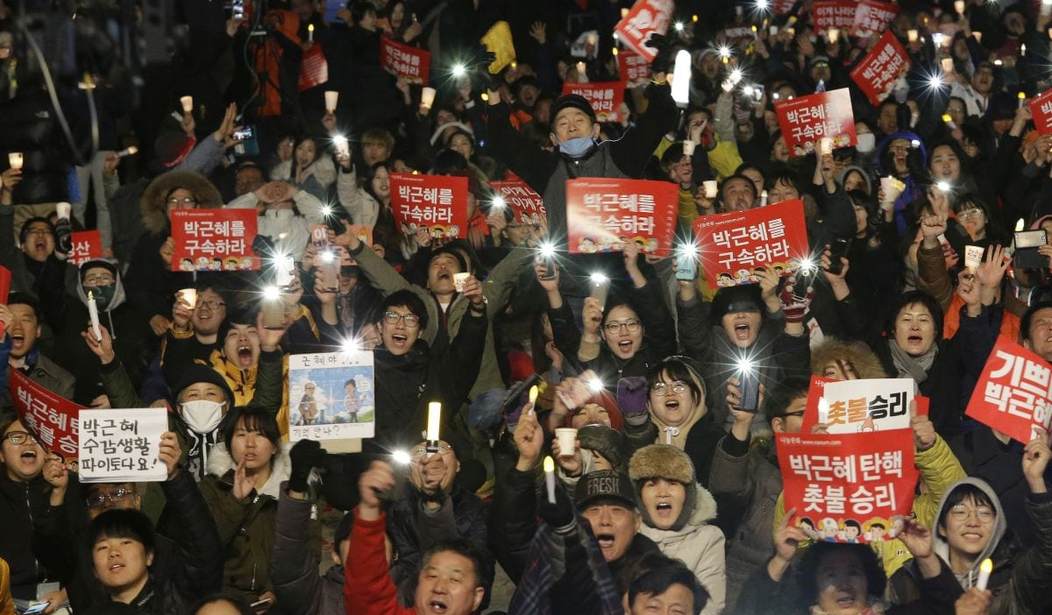Violent protests, which killed two and injured dozens more, erupted following a ruling by South Korea’s Constitutional Court that upheld the vote last December by the National Assembly impeaching President Park Geun-hye.
A spokesman for the ousted president said President Park would not make any statement and would not leave the South Korean presidential residence today. Opponents had urged her to make a clean break and issue a statement saying she accepted the court’s ruling. Her refusal to do so threatens to unleash more violence from her supporters.
The corruption scandal that engulfed President Park featured a Rasputin-like character who appeared to be a power behind the scenes, manipulating the president and her top aides while enriching himself. Here’s a backgrounder on the scandal, which eventually ensnared the son of Samsung’s chairman and several other businessmen.
The State Department issued a statement saying that the impeachment was an internal matter and none of our business. But there is clearly concern among U.S. policymakers that the political crisis, which is occurring during a period of heightened tensions with North Korea and China, could alter our relationship with the South and lead to the North trying to take advantage of the chaos.
With Park’s ouster, South Korea will hold a snap election within 60 days in what is guaranteed be a campaign frenzy. Opinion polls so far show the left-leaning Moon Jae-in, who lost to Park in 2012, as the front-runner.
Liberals in South Korea typically favor a more conciliatory approach with Pyongyang, and many oppose the US missile defense system known as the Terminal High Altitude Area Defense, or THAAD, which is designed to intercept incoming missiles, conceivably from North Korea.
Meanwhile, conservatives such as Park have retained a more hawkish view on North Korea and generally support US policies, including THAAD.
“If progressives take power, I do think issues like THAAD and North Korea policy could be on the table, which would have huge consequences for the US right now,” said David Kang, director of the University of Southern California’s Korean Studies Institute.
After nine years of conservative leadership and a scandal-marred Park presidency, South Korea may be signaling it’s ready for a change. The conservatives lost their majority in a shock defeat in parliamentary elections last year.
New leadership in Seoul could mark a shift on two key issues in US and South Korea relations — the missile defense system and the position on North Korea.
The first pieces of the THAAD defense system arrived this week in South Korea. The project has been fiercely opposed by China and Russia as a threat to their security.
China has raised significant economic pressure on South Korea to scrap the defense system through threats to a South Korean retail group and restrictions on Korean products and possibly travel to the country. These have triggered fears of a trade war, which would be crushing for South Korea since trade with China accounts for about a quarter of its exports.
Regardless of the pressure from Beijing, THAAD already has its share of critics within South Korea. Opposition parties have sought a vote on the missile defense system in parliament once the country’s political uncertainty is resolved.
South Koreans generally don’t want to weaken the alliance with the United States, but if the next leader walks back on THAAD, “we’d have a real change in the Korean policy toward the US,” said Kang, who is also the director of the USC Center for International Studies.
Such a scenario would be a win for China and a blow for the United States.
A rejection of THAAD by a more liberal government would signal a sea change in U.S.-South Korean relations. The liberals tend to offer a more conciliatory approach to relations with the North and would almost certainly seek out warmer relations with China. This would present a problem for the U.S., which is currently embroiled in a tense situation with Beijing in the South China Sea as China seeks to militarize several manmade islands that would threaten U.S. regional allies and commercial shipping lanes.
But the immediate problem is the reaction of North Korea to the political crisis in the South. Would they seek to exploit it? Recent provocative actions by the North, including testing several ballistic missiles and apparently assassinating Kim Jong-un’s half brother using a banned nerve agent, could indicate a more aggressive attitude by the North Korean government.
Indeed, Jeffrey Lewis, writing in Foreign Policy, says the North is actually practicing for a nuclear first strike on U.S. military bases:
The United States and South Korea are conducting their largest annual joint military exercise, known as Foal Eagle. The exercise, which is really a series of exercises, lasts two months and involves tens of thousands of U.S. and South Korean military personnel, as well as an aircraft carrier, bombers, and — guess what? — F-35 aircraft based out of Iwakuni. Foal Eagle is a rehearsal for the U.S.-Republic of Korea war plan, known as OPLAN 5015, which has been described as a pre-emptive strike against North Korea, including its leadership, as a retaliation for some provocation. Whether that’s a fair description or not, the North Koreans certainly think the annual exercise is a dress rehearsal for an invasion. This year’s menu of fun and games reportedly includes a U.S.-ROK special operations unit practicing an airborne assault on North Korea’s nuclear and missile facilities.
What North Korea is doing is simply counterprogramming the Foal Eagle with its own exercise. If we are practicing an invasion, they are practicing nuking us to repel that invasion.
What is disturbing about the situation, though, is how the war plans of North Korea, South Korea, and the United States might interact. North Korea’s military exercises leave little doubt that Pyongyang plans to use large numbers of nuclear weapons against U.S. forces throughout Japan and South Korea to blunt an invasion. In fact, the word that official North Korean statements use is “repel.” North Korean defectors have claimed that the country’s leaders hope that by inflicting mass casualties and destruction in the early days of a conflict, they can force the United States and South Korea to recoil from their invasion. While U.S. officials usually bluster that Kim would be suicidal to order the large-scale use of nuclear weapons, it’s obvious that a conventional defense didn’t work for Saddam Hussein or Muammar al-Qaddafi when they faced an onslaught of U.S. military power. That was suicide. Of course, that’s where those North Korean ICBMs come in: to keep Trump from doing anything regrettable after Kim Jong Un obliterates Seoul and Tokyo.
A chilling prospect, indeed. And the notion that the U.S. would simply obliterate the North with its own nuclear salvo is complicated by the close proximity of South Korea to the nuclear blasts. Nuclear fallout would be just as deadly to the South as it would be to the North.
Kim Jong-un knows all this which is why the threat of a first strike is almost as good as the real thing. The current crisis in South Korea will probably not embolden the North to precipitate some kind of military crisis. But it would give Kim a decided advantage in the psychological warfare that might convince the South to elect a more pliant leader than the hardliner Park.










Join the conversation as a VIP Member